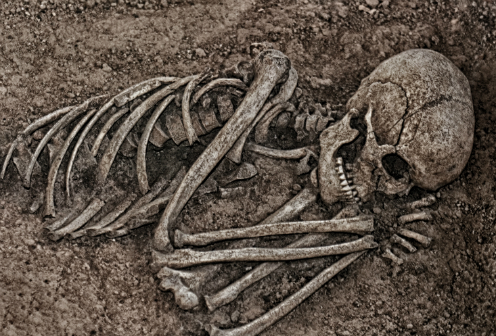Head of Center Eske Willerslev and Professor Thomas Werge have been granted DKK 60 million from the Lundbeck Foundation to study the evolution of brain diseases
The head of the DNRF’s Center for GeoGenetics Eske Willerslev and Professor Thomas Werge have received DKK 60 million from the Lundbeck Foundation to fund a new research center that will aim to map the evolution of brain diseases. Some of the work at the new center will build on the outstanding research led by Willerslev at the Center for GeoGenetics in recent years.

A new research center that aims to map the interaction between human DNA and brain diseases through history will be launched this autumn at the University of Copenhagen. The center will be led by the head of the DNRF’s Center for GeoGenetics, Eske Willerslev, and the head of the Department of Biological Psychiatry at the University of Copenhagen, Thomas Werge. The new research center is being funded with a grant of DKK 60 million from the Lundbeck Foundation and will be named the Lundbeck Foundation Centre for Disease Evolution.
“The work at the new center will be a natural extension of the work done at the Center for GeoGenetics. The studies of human migration over time conducted at GeoGenetics are a fundamental prerequisite for us to begin studying the disease evolution in genomes of humans from the past,” said Professor Eske Willerslev. He continued:
“For instance, we hope that the results of these studies may be of direct relevance to the understanding of mental disorders and neurological diseases as well as contribute to the treatment and de-stigmatization of patients. Without the basic research done at GeoGenetics over the past nine years, this new project would not be possible at all.”
Knowledge about diseases of the past can lead to new vaccines
Willerslev will now continue and complete the ongoing projects at the Center for GeoGenetics, which will complete its 10-year grant period from the Danish National Research Foundation in the summer of 2019. Several of the projects underway at GeoGenetics are also supported by the Lundbeck Foundation through a Lundbeck Foundation professorship to Willerslev.
During the DNRF grant period, basic research done at the Center for GeoGenetics has led to significant research breakthroughs, many of which have been associated with major studies of past disease epidemics – research that will also be included in the work at the upcoming center.
“For example, in search of an explanation of extreme population dynamics among people in Asia in the Bronze Age, we discovered that there are disease-related bacteria and viruses in ancient skeletons. This led to our discovery of the oldest known human plague epidemic, which unfolded 3,000 years earlier than it had previously been thought epidemics existed,” explained Willerslev.
Such studies have made it possible for the Center for GeoGenetics to create an in-progress catalog of the genetic disease variants that have existed throughout human history. The catalog can contribute to the development of vaccines because the known genetic variants from the past are likely to return.
“Our catalog will enable us to study whether today’s vaccines already cover the most dangerous genetic variants of the past, or if researchers need to develop new vaccines, so you ‘can put out the fire, before it begins,’ so to speak,” explained Willerslev.
Fantastic example of basic research’s role in society
Willerslev believes that the grant from the Lundbeck Foundation to the forthcoming research center is a fantastic example of what basic research can lead to and the important role it plays in society:
“In the beginning, we were driven by our curiosity about where we humans originated from and had no idea where it would lead us. There were no specific plans for our research to be relevant for medical research and disease control. We were just curious. That is what basic research can do: ‘breaking the ice’ in new ways that no one could foresee and ultimately be beneficial for society,” said Willerslev
Søren-Peter Olesen, director of the DNRF, agrees with Professor Willerslev and is pleased to see the continuation of the work done at the Center for GeoGenetics.
“It is always a great pleasure when one of the foundation’s grant holders is noticed and rewarded for outstanding research. We congratulate Eske Willerslev on this significant research grant and look forward to following what the research from the Center of GeoGenetics will develop into in the future,” said Olesen.
Research at the new Center for Disease Evolution will primarily be based on DNA mapping from 1,000 ancient human skeletons. The bones originate from Europe and Western Asia and are from a period ranging from 1850 AD to the Old Stone Age 10,000 years ago.
Read more about the upcoming center at the Lundbeck Foundation’s website here
More can be found at the website of University of Copenhagen here (in Danish)
